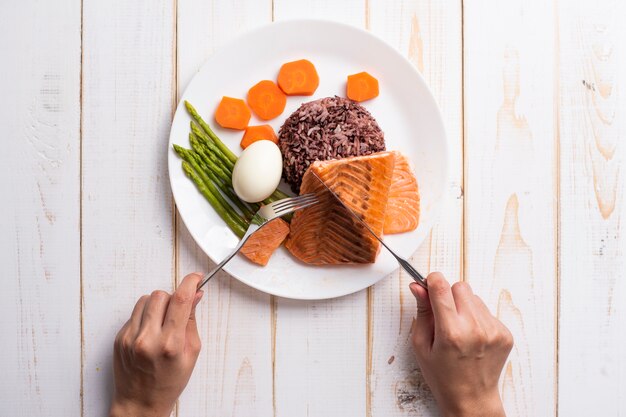Navigating the IBS Diet: What to Eat for Simplicity and Comfort
Irritable Bowel Syndrome (IBS) is a common digestive disorder that can significantly impact daily life. For those affected, figuring out what to eat often feels like navigating a maze. Foods that sit well one day might cause discomfort the next. If you're wondering what to eat with IBS to minimize symptoms and promote digestive health, you've come to the right place. Here, we'll explore not only the best food choices but also tips to create a balanced, enjoyable diet that contributes to overall well-being.
Understanding IBS and Its Dietary Implications
Before diving into the specifics of an IBS-friendly diet, let’s touch on the basics of IBS itself. IBS is a gastrointestinal disorder characterized by symptoms like stomach cramps, bloating, diarrhea, and constipation. The condition’s exact cause remains unknown, but it often involves a combination of gut motility issues, increased gut sensitivity, and changes in gut flora.
The Role of Diet in Managing IBS
Diet plays a pivotal role in managing IBS symptoms. Individual reactions to different foods can vary. Therefore, a personalized approach is crucial. Common dietary strategies involve identifying and avoiding trigger foods and including those that support gut health.
Building an IBS-Friendly Diet
Embrace Low-FODMAP Foods
One popular dietary approach is the Low-FODMAP diet, which stands for fermentable oligosaccharides, disaccharides, monosaccharides, and polyols. These are carbohydrates that some people find difficult to digest. Foods high in FODMAPs can cause increased water content in the gut and bloating. Here’s a brief list of low-FODMAP foods you might consider:
- Fruits: Berries, oranges, and grapes
- Vegetables: Carrots, spinach, and cucumbers
- Proteins: Eggs, chicken, and firm tofu
- Grains: Rice, oats, and quinoa
- Dairy: Lactose-free products or hard cheeses like Parmesan
Fiber: The Good and the Bad
Fiber presents a double-edged sword to those with IBS. Insoluble fiber found in whole grains and vegetables can exacerbate symptoms, while soluble fiber can help manage them. Opt for foods rich in soluble fiber such as:
- Oats
- Bananas
- Sweet potatoes
- Carrots
- Lentils in moderation
Focus on Hydration
Keeping hydrated aids digestion and helps move fiber through the digestive system efficiently. Drink plenty of water, herbal teas, or other non-caffeinated beverages throughout the day.
Practical Meal Planning for IBS
Breakfast
A soothing choice for many is overnight oats made with lactose-free milk or a dairy-free alternative, topped with a banana or a handful of blueberries. Another option is scrambled eggs with sautéed spinach on a slice of gluten-free bread.
Lunch
A salad with grilled chicken, mixed greens, cucumber, and a side of quinoa can provide nutrients without upsetting your stomach. Use a simple vinaigrette with olive oil and lemon juice for flavor.
Dinner
Baked salmon with a side of roasted sweet potatoes and steamed green beans offers a nutritious, balanced meal. Alternatively, try a stir-fry using low-FODMAP vegetables with tofu and a gluten-free soy sauce.
Snacks
For simple snacks, consider rice cakes with almond butter, lactose-free yogurt with papaya, or carrot sticks with hummus. These options are easy on the gut and can keep hunger at bay without triggering symptoms.
Related Strategies that Support IBS Management
Mindful Eating
Eating mindfully by chewing thoroughly and savoring each bite can aid digestion. It helps you recognize when you're full, potentially preventing overeating or consuming food too quickly, both common IBS triggers.
Keeping a Food Diary
Recording what you eat and any subsequent symptoms helps identify triggers. Over time, patterns emerge, guiding you toward making informed dietary choices.
Stress Management
Stress can worsen IBS symptoms. Incorporate stress-reducing activities such as yoga, meditation, or even a simple walk outside to encourage overall wellness.
Identifying Triggers: What to Avoid
High-FODMAP Foods
Generally, foods high in FODMAPs should be limited. These include:
- Apples, pears, and stone fruits
- Onions and garlic
- Wheat-based foods
- Beans and lentils
- Dairy products high in lactose
Caffeine and Alcohol
Both caffeine and alcohol can worsen IBS symptoms by irritating the gastrointestinal tract. Consider moderating or eliminating these from your diet depending on your sensitivity.
Processed Foods
Processed foods, often high in preservatives and artificial ingredients, can be problematic for the gut. Sticking to whole, unprocessed foods generally proves more gentle.
Conclusion: Your Path to Digestive Comfort
Managing IBS symptoms through diet doesn't have to be daunting. By incorporating low-FODMAP foods, staying hydrated, and practicing mindful eating, you can take significant steps toward minimizing discomfort and enhancing daily functioning. Remember, dietary needs can vary from person to person; it's vital to observe your body’s reactions and adjust accordingly. Over time, you'll discover the foods that work best for you and support a peaceful digestive journey.
Digestive Health Tips for IBS:
- 🍎 Choose low-FODMAP fruits like berries and citrus.
- 🥕 Favor soluble fiber sources such as oats and sweet potatoes for gentle digestion.
- 💧 Maintain hydration to aid digestive processes.
- 🥗 Plan meals with nutrient balance in mind, including lean proteins and gentle vegetables.
- 🗒️ Keep a food diary to track what triggers symptoms and adjust your diet accordingly.
- 🧘♀️ Incorporate stress management techniques like yoga or meditation to support gut health.
- ⚠️ Avoid common triggers like high-FODMAP foods, caffeine, and alcohol.
By adopting these practices, you can navigate the challenges of IBS with increased ease and comfort.

